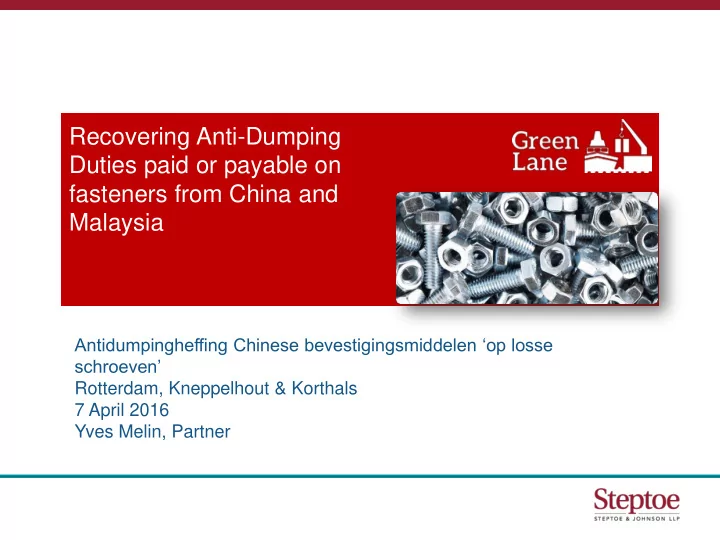

Recovering Anti-Dumping Duties paid or payable on fasteners from China and Malaysia Antidumpingheffing Chinese bevestigingsmiddelen ‘op losse schroeven’ Rotterdam, Kneppelhout & Korthals 7 April 2016 Yves Melin, Partner
The anti-dumping duties - Dashboard Anti-dumping duties on imports of carbon steel fasteners In place for China since 1 February 2009 In place for Malaysia since 27 July 2011 (circumvention) Residual duty of 85% from 1 February 2009 to 10 October 2012 Residual duty of 74,1% from 11 October 2012 to 27 Feb. 2016 Some Chinese companies have individual duties ranging from 0 to 77,5%, then as from 10.10.2012 from 0 to 54,1% Some Malaysian companies are exempted and have a 0 % duty
Chinese challenges before the WTO First WTO challenge by China, first defeat of the EU in 2011 Commission reopens the investigation, and reduces the duties in October 2012 Second WTO challenge by China in 2013 (compliance procedure), second defeat by the EU in 2016 Commission terminates the measures on 27 February 2016, specifically excluding retroactivity (Commission Implementing Regulation (EU) 2016/78)
China is happy. Should you?
Relevance of the EU’s WTO defeat The Commission withdrew the duties as from 28 February 2016 Not entirely clear what should happen to the duties not yet collected The WTO dispute settlement body considered that the EU duties violated a number of the provisions of the WTO Agreement on Anti-dumping (ADA) Anti-dumping investigations in the EU are governed by a basic anti- dumping Regulation , which is very similar to the ADA The validity of EU duties must often be reviewed against WTO rules as well, and the EU basic Regulation is interpreted in line with the WTO ADA
Relevance of the EU’s WTO defeat (continued) Relevance: There are now three very solid arguments on substance for challenging the legality of the duties before customs courts Three of the breaches identified by the WTO Dispute Settlement Body (DSB) are likely breaches of the basic anti-dumping Regulation as well The analysis of the WTO DSB could therefore be used to illustrate why the duties have always been illegal under EU law One limitation: the three-year deadline of Article 236 of the CCC
The duties have always breached the EU basic anti-dumping Regulation Illegal definition of the Union industry – linked to EU producer’s willingness to be included in the injury sample, resulting in a self-selection process among EU producers: material risk of distorting the definition of the Union industry – There is no evidence that the EU industry ever suffered injury – This could not be cured Illegal exclusion of certain Chinese export sales when calculating the dumping margin. – All exports of products types that were not made in India (analogue country) were disregarded – Commission is obliged to take into account all exports of fasteners, without excluding any models
The duties have always breached the EU basic anti-dumping Regulation (continued) The Commission refused to adjust differences between the normal value and the export price – Relates to the adjustment of Chinese cost items: import duties and other charges on raw materials in the analogue country, different energy costs, different productivity, different efficiency – No Commission analysis of whether the costs items in China were distorted, or whether granting the claimed adjustments would have introduced a distortion of the Indian prices – The Commission also failed to provide the Chinese producers early in the investigation with the information necessary to have a meaningful opportunity to request and substantiate adjustments
How to get the duties back? Request the annulment of the Regulations imposing the anti-dumping duties Case needs to be brought before a customs court The customs court needs to ask a preliminary question to the Court of Justice of the EU in Luxembourg The Court of Justice will decide on this once, and will answer the first question received Some countries are faster than others. We have done this before with success (Ikea Wholesale)
www.mcguirewoods.com
Questions or Comments? www.steptoe.com
Recommend
More recommend